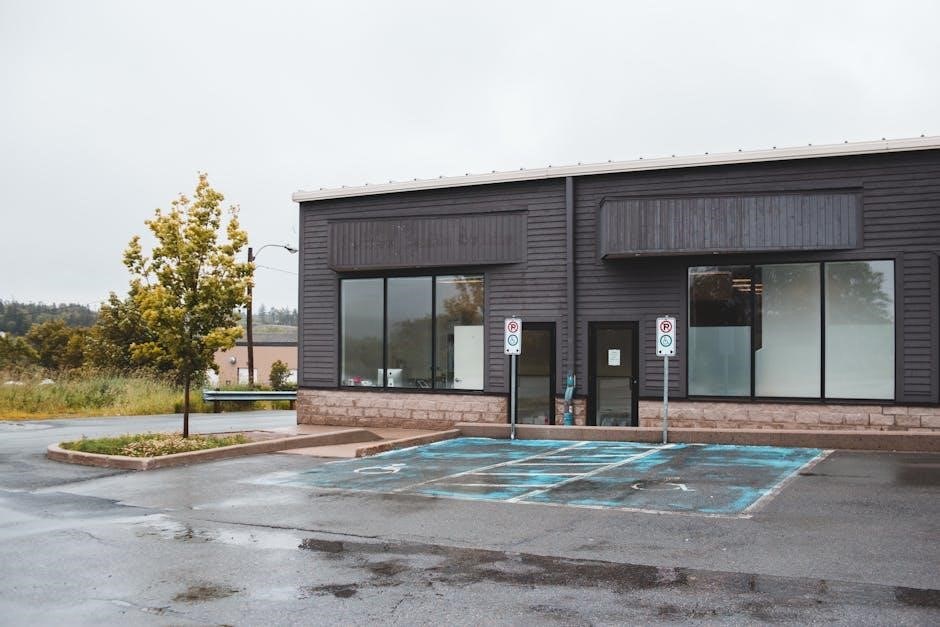handicap parking permit georgia pdf
The Georgia MV-9D form, administered by the Department of Revenue, enables individuals with disabilities to obtain parking permits, ensuring accessible parking solutions through legal certification and proper documentation for placards or plates.
1.1 Overview of the Georgia Handicap Parking Permit Program
The Georgia Handicap Parking Permit Program, managed by the Department of Revenue, provides accessible parking solutions for individuals with disabilities. It offers temporary, permanent, and special permits for modified vehicles. Applicants must submit the MV-9D form, certified by a healthcare provider, to qualify. The program ensures legal parking accommodations, promoting mobility and accessibility for eligible residents.
1.2 Importance of the MV-9D Form for Parking Permits
The MV-9D form is crucial for obtaining a Georgia handicap parking permit. It serves as the official certification document, verifying an individual’s eligibility based on medical conditions. Completed by a healthcare provider, it ensures compliance with state regulations and streamlines the application process for both temporary and permanent permits, guaranteeing accessibility for disabled individuals.
Application Process for a Handicap Parking Permit in Georgia
The process involves completing the MV-9D form, certifying eligibility, and submitting it to the county tag office. It ensures proper documentation for permit issuance, covering temporary and permanent needs.
2.1 Eligibility Requirements for a Disability Parking Permit
Eligibility is based on medical conditions like ambulatory disabilities, heart or lung diseases, severe arthritis, or visual impairments. Applicants must have a disability affecting mobility. A licensed healthcare provider must certify the condition on the MV-9D form. Temporary or permanent permits are issued based on the nature of the disability, ensuring legal parking accommodations for individuals with qualifying conditions.
2.2 Required Documentation for the Application
The application requires a completed MV-9D form, a photo ID, and certification from a licensed healthcare provider. Temporary permits need medical verification of the disability’s duration. Institutions must provide a business license and EIN. Applicants must submit these documents to their local County tag office for processing, ensuring all information is accurate and meets Georgia’s legal requirements.
2.3 Steps to Submit the MV-9D Application Form
Complete the MV-9D form accurately, ensuring all sections are filled. Submit the form to your local County tag office in Georgia. Temporary permits require certification from a healthcare provider, while permanent permits need a licensed physician’s verification; Once submitted, the County office processes the application. No fees apply for temporary or permanent permits, and applicants can check the Georgia Department of Revenue website for updates.
Types of Handicap Parking Permits Available in Georgia
Georgia offers temporary, permanent, and special permanent parking permits for individuals with disabilities. These permits are free and designed to accommodate varying needs, ensuring accessible parking solutions.
3.1 Temporary Parking Permits
Temporary parking permits in Georgia are issued for short-term disabilities, valid for up to six months. They require certification from a licensed healthcare provider and cannot be extended. A new application must be submitted if additional time is needed. These permits are free and designed for individuals with temporary mobility challenges, ensuring accessible parking during recovery periods.
3.2 Permanent Parking Permits
Permanent parking permits in Georgia are issued for individuals with long-term disabilities. These permits are free and require certification from a licensed healthcare provider. They are designed for disabilities that are permanent in nature, ensuring ongoing accessibility to parking spaces. Applicants must submit the MV-9D form to their local county tag office to obtain this permit, which provides consistent parking accommodations.
3.3 Special Permanent Parking Permits
Special Permanent Parking Permits in Georgia are reserved for individuals with severe disabilities, such as those requiring hand controls or the loss of both upper limbs. These permits are issued as gold placards and require detailed medical certification. They are free and designed for individuals with specific mobility challenges, ensuring specialized parking accommodations. Applications must be submitted through the MV-9D form to the local county tag office.

Understanding the MV-9D Form
The MV-9D form is essential for requesting Georgia handicap parking permits, requiring certification from healthcare providers and submission to the county tag office for processing.
4.1 Purpose and Structure of the MV-9D Form
The MV-9D form is designed to request a Person with Disability Parking Placard or Disabled Persons License Plate in Georgia. It includes sections for applicant details, healthcare provider certification, and institutional information. The form must be submitted to the local County tag office and is not intended for changes in ownership, address, or license plate classification. It ensures legal compliance for disability parking accommodations.
4.2 Sections of the MV-9D Form and Their Significance
The MV-9D form includes sections for applicant details, healthcare certification, and institutional information. Each section ensures accurate identification and validation of disability status. The form requires notarization for legal compliance, verifying the applicant’s eligibility for a parking permit. Proper completion of all sections guarantees seamless processing and issuance of the desired disability parking accommodation in Georgia.
4.3 Certification Requirements from Healthcare Providers
Certification from a licensed healthcare provider is mandatory for obtaining a handicap parking permit in Georgia. The provider must validate the applicant’s disability, ensuring it meets legal criteria. This section of the MV-9D form requires a detailed medical assessment, confirming eligibility for a parking placard or license plate. The healthcare provider’s signature ensures compliance with state regulations and verifies the applicant’s condition, preventing fraudulent applications.

Submission and Processing of the Application
Submit the completed MV-9D form to your local Georgia County tag office. Processing times vary, but no fees apply for temporary or permanent permits.
5.1 Where to Submit the Completed MV-9D Form
The completed MV-9D form must be submitted to the local County tag office in Georgia where the applicant resides. Visit the Georgia Department of Revenue website at https://dor.georgia.gov to find specific county office locations. Submission can be done in person, ensuring all required documentation is included for proper processing. Institutions and businesses must also submit to their respective County offices.
5.2 Processing Time and Fees Associated with the Permit
Temporary and permanent handicap parking permits in Georgia are free. The Disabled Persons License Plate incurs a $20 fee plus applicable taxes. Processing times vary, but submissions are typically handled promptly upon receipt at the County tag office. Ensure all documentation is complete to avoid delays. No additional fees apply for renewal or replacement requests, provided forms are correctly submitted.
Legal Use and Misuse of Handicap Parking Permits
Handicap parking permits must be displayed only when transporting individuals with disabilities. Misuse, such as unauthorized lending, can lead to penalties under Georgia law, ensuring lawful accessibility for rightful users.
6.1 Proper Display and Use of the Parking Placard
The parking placard must be displayed only when the vehicle is parked and being used to transport a person with a disability. It should hang from the rearview mirror and be clearly visible. The placard is only for the authorized user and cannot be shared or transferred. Misuse, such as lending it to others, is illegal and can result in fines or revocation of the permit under Georgia law. Proper use ensures accessibility for those who genuinely need it.
6.2 Penalties for Misuse of a Handicap Parking Permit
Misusing a handicap parking permit in Georgia is a misdemeanor under state law, punishable by fines and potential revocation of the permit. Unauthorized use, such as lending the placard to others, can result in legal consequences. Proper use must be ensured to maintain the integrity of the program and prevent fraudulent activity, as outlined in Georgia Code 40-2-74(a.1).
Renewal and Replacement of Parking Permits
Renewing or replacing a Georgia handicap parking permit involves submitting updated documentation. Permanent permits require recertification, while replacements are issued for lost or stolen placards, ensuring continued accessibility.
7.1 Renewal Process for Permanent Parking Permits
To renew a permanent parking permit in Georgia, applicants must submit a recertified MV-9D form by a licensed healthcare provider. The form is then submitted to the local county tag office, with no notarization required. Renewals ensure continued accessibility for individuals with permanent disabilities, maintaining their parking privileges without interruption. Proper documentation and timely submission are essential for a smooth renewal process.
7.2 How to Replace a Lost or Stolen Parking Permit
To replace a lost or stolen permit, complete Sections A, B, and F of the MV-9D form. Indicate “Lost” or “Stolen” as the reason and provide the previous placard number. Submission is made to the local county tag office, with no notarization required. This process ensures uninterrupted access to parking accommodations for individuals with disabilities in Georgia.

Institutional and Business Applications
Institutions and businesses in Georgia may apply for parking permits if vehicles are primarily used for transporting disabled individuals. Documentation and specific eligibility criteria apply.
8.1 Eligibility for Institutions and Businesses
Institutions defined under Georgia Law 31-7-1 and businesses may apply for permits if vehicles primarily transport disabled individuals. Institutions must attach a copy of their license, while businesses must meet Georgia Code 40-2-74 requirements, ensuring vehicles are used mainly by disabled employees. A business license copy is required for verification.
8.2 Special Requirements for Institutional Parking Permits
Institutions must submit a copy of their license and certify that vehicles are primarily used to transport disabled individuals. Businesses must meet Georgia Code 40-2-74, ensuring vehicles are used mainly by disabled employees. A business license copy is required, and vehicles must comply with specific use restrictions to qualify for institutional parking permits.
Common Misconceptions About the Georgia MV-9D Form
A common myth is that the MV-9D form can be used to change vehicle ownership or address, which is incorrect. It is solely for parking permits.
9.1 Clarifying Myths About the Application Process
A common misconception is that the MV-9D form can be used for vehicle ownership changes or address updates, which is incorrect. Additionally, some believe that only vehicle owners can apply, but non-owners with disabilities are also eligible. The form is strictly for parking permits, ensuring clarity and avoiding confusion in the application process for disabled individuals in Georgia.

Benefits of Obtaining a Handicap Parking Permit in Georgia
Obtaining a handicap parking permit in Georgia ensures accessible parking, convenience, and legal compliance, enabling individuals with disabilities to park in designated spaces without violations or restrictions.
10.1 Convenience and Accessibility for Disabled Individuals
A Georgia handicap parking permit offers significant convenience, allowing individuals with disabilities to park in reserved spaces, reducing mobility strain. It ensures easy access to public venues, saving time and effort. The permit also provides legal parking privileges, promoting independence and equality for disabled individuals in their daily lives across the state.
10.2 Legal Compliance and Avoiding Parking Violations
Obtaining a Georgia handicap parking permit ensures legal compliance, preventing fines and penalties from misuse. Proper display and use of the placard are crucial to avoid violations. Adhering to Georgia’s parking laws guarantees that parking privileges remain valid, safeguarding individuals from legal complications and ensuring continued accessibility to designated parking areas.

